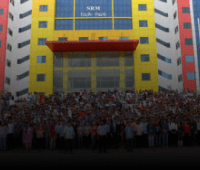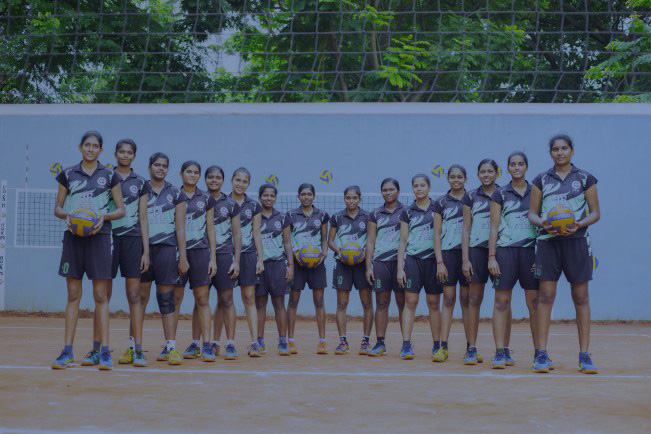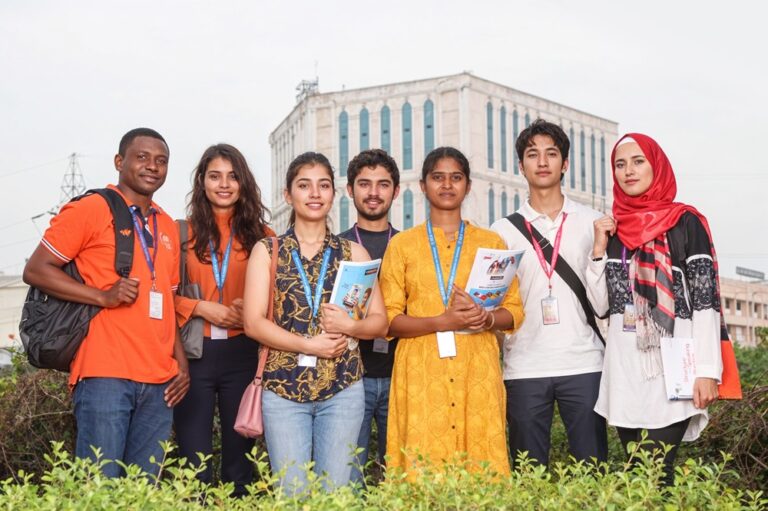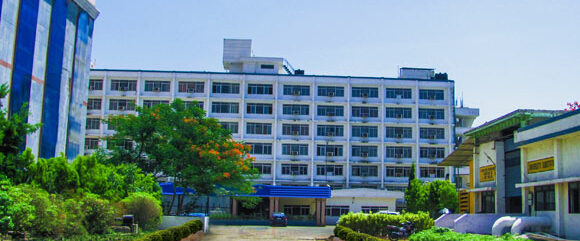EMPLOYEE SERVICE RULES
The Vision of the University
To emerge as a World – Class University in creating and disseminating knowledge and providing students a unique learning experience in Science, Technology, Medicine, Management and other areas of Scholarship that will best serve the world and for the betterment of mankind.
The Mission of the University
MOVE UP through international alliances and collaborative initiatives to achieve global excellence.
ACCOMPLISH A PROCESS to advance knowledge in a rigorous academic and research environment.
ATTRACT AND BUILD PEOPLE in a rewarding and an inspiring environment by fostering freedom, empowerment, creativity and innovation.
MOTTO of the University is Learn. Leap. Lead
The University stands by the VALUES:
Excellence, Integrity and Academic Freedom
The University is committed to be a leading player in the academic world through excellence in teaching and research, while placing utmost value on the freedom to conduct academic activities that are subject to the highest standards of academic integrity.
Global Vision and Local Commitment
The institution being a leading academic institution with a global influence, brings together the global thought leaders to make significant contributions to the economic and social development both locally and nationally. In addition, SRMIST encourages its faculty members, staff and students to dedicate themselves to serve the local community.
Inclusiveness, Diversity and Respect
The institution values and respects the differences of individuals, whether they are from different geographies, socio-economic status, cultural background or religion. It strives to embrace these diverse forces to foster an inclusive and caring environment which will allow us to harness the richness of ideas and perspectives for the benefit of the whole community.
CAMPUSES
The University sprawls over a total land area of about 460 acres with a built-up area of over 12 million square feet. It has positioned itself at five regions in the country:
- Kattankulathur in Chengalpattu district, Tamil Nadu
- Ramapuram in Chennai city, Tamil Nadu
- Vadapalani in Chennai city, Tamil Nadu
- Modi Nagar, in NCR, New Delhi
- Tiruchirappalli, Tamil Nadu
FACULTIES AND PROGRAMS
The University offers academic programs in six major Faculties, namely, Engineering & Technology, Medicine & Health Sciences, Science & Humanities, Management, Law and Agricultural Sciences through 23 Schools, 116 Departments and 14 Centers of Excellence, offering 109 UG and 145 PG programs under full time mode, 5 UG and 6 PG programs and under DDE/OE and doctoral programs in over 100 disciplines.
1. Definitions And Classification Of Employees
1.1. DEFINITIONS
- “Institute” means the SRM Institute of Science and Technology.
- “Employee” means any person employed by the Institute as Teaching and Non-Teaching.
- “Faculty” means those who are engaged in Teaching, Instruction, Research, Projects and all other academic-related activities, involved in imparting knowledge to the Students of this Institute.
- “Institution” means all the Colleges/Schools/Centres and Directorates of SRMIST.
- “Campus” means the Institute’s buildings, any other land owned within compounds and any place in the Institute or leased by the Institute where it performs or undertakes its work, including residential accommodation provided by the Institute, and its precincts thereof.
- “Vice Chancellor” means any person duly appointed by the Chancellor of SRMIST.
- “Registrar” means any person duly appointed by the Executive Council of SRMIST.
- “Habitual” means any act of fault or misconduct or omission committed by a person for a minimum of three times and within a period of 3 (three) months.
- “Salary” means all remuneration earned which comprises Basic Pay, Dearness Allowance, House Rent Allowance, Conveyance Allowance, Special Allowance, and any other allowance per month exclusive of overtime payment.
- “Leave” means authorized absence with or without pay.
- “Absence from work” shall mean not present on the workplace, late attendance, or leaving the workplace early without the approval of the authorities.
1.2. CLASSIFICATION:
In general, the employees of SRMIST shall be classified into three categories
- Faculty members
- Non-Teaching Academic staff
- Non-Teaching Administrative Staff
Faculty Members – A person who engages in the Teaching-Learning Process (TLP) and also performs academic activities in the Institution
Non-Teaching Academic staff– A person who assists academicians in the academic activities of the Institution
Non-Teaching Administrative Staff – A person who is not involved in teaching but assists in academic activities and performs all Administrative works of the institution.
The employees of SRMIST come under any one of the following categories
- Probationers;
- Permanent;
- Consultant;
- ‘Probationer’ – A person appointed by the institution in order to fill up a vacancy of a permanent post. However, the probation period is 12 months. This may be extended or turned down when the performance of the employee is not satisfactory during the probation. The probationary employee continues to be on probation until a letter of confirmation or discharge of probation is issued.
- ‘Permanent Employee’ – A person employed on a permanent basis and whose appointment has been confirmed in writing by the Registrar or other Officer authorized to do so and includes any person who has satisfactorily completed the prescribed period of probation
- ‘Consultant’– A person employed after attaining the age of Superannuation/ Retirement or whose services are extended.
2. ADMINISTRATION POLICY
2.1. Communication
The Heads of the Department will ensure that all their employees are kept informed about all official matters. Confidentiality should be maintained in all official and employee related matters.
2.2. Workplace Violence
Workplace violence is strictly prohibited.
2.3. No Smoking
Smoking is prohibited inside the campuses.
2.4. Confidentiality
- All employees are advised not to divulge any confidential information related to work without the knowledge/consent of the authorities concerned.
- Any such materials/assets of the University used by the employee of SRMIST shall be returned to the Institution once their work is completed.
2.5. Reporting
Employees are required to report any theft or fraud including possibilities thereof to their concerned authorities. Concealment of such information will be construed as misconduct.
2.6. Service Conditions
- Every employee must abide by all the conditions herein stated and the changes made time to time.
- All employees are expected to devote his/her service to the institution with utmost loyalty and also uphold the decorum of the institution at all times.
- If any employee is found to be the route cause for any issues or violence, he/she will be subjected to severe disciplinary action, as per the disciplinary procedure, which will even lead to immediate dismissal/removal from the Institution.
- Any employee, on appointment, except on contract, shall be on probation for a period of one year. The probation period may be extended based on his/her performance.
- All the teaching, academic and administrative staff members are recruited as per the norms of UGC/ AICTE and the pay band is fixed based on the norms.
2.7. Employment and Hours of Work
2.7.1. Working Hours of Employees:
- All employees shall be in time for work as notified.
- SRMIST on special occasions is entitled to call employees to report to work on holidays or work overtime.
- For faculty members, working days will be from Monday to Friday. Saturday will also be a working day on special circumstances. For other employees working days will be Monday to Saturday. The working hours will be as fixed time to time by the authorities. Half an hour lunch break between 1p.m. and 2 p.m. is ideal.
- The employee shall not leave the work place earlier than the prescribed working hours. For any unavoidable reason, if an employee has to leave the workplace earlier, prior written permission shall be obtained from the respective Deans/ Directors/ Section Heads.
2.7.2. Attendance
- ID cards are given to all categories of employees. ID card shall bear the name of the employee, identity number and designation.
- By using the employee ID card, attendance for in-time and out-time shall be marked.
- Any employee who fails to register his/her attendance in the manner specified herein shall be liable to be treated as ‘absent’.
- All employees shall be at their place of work at the time fixed. An employee arriving late to the institution has to apply for permission/ leave in the e-manager.
- An employee found absent during working hours without permission or without proper reasons, shall be liable to be treated ‘absent’ for the period of such absence.
- All the employees should mark their attendance for in and out time on all the working days. Non-marking of attendance shall be treated as absence.
- Normally permission is granted only for one hour on two occasions. The request for permission should be made to the Deans/ Directors/respective Section Heads in advance.
- In order to maintain discipline and promptness in attending work, all the employees are expected to co-operate by abiding to all the rules.
3. Recruitment and Selection Process
The selection process is done purely on a merit basis. SRMIST embraces cultural diversity hence, the employees are recruited accordingly. Quality is never compromised in the recruitment process under any circumstances.
3.1 Recruitment Procedure
Whenever a vacancy arises, the requirement is notified to the Registrar’s Office by the Deans of the School/Heads of Sections along with the Manpower Requisition Form. The Manpower Requisition Form will be scrutinized by the Registrar, comparing the forecasted workload for the forthcoming semester. As per the norms of AICTE/ UGC, the Manpower requirement sheet will be prepared by the concerned Deans of the Schools. After forecasting, if the requirement is justified, the approval will be given by the Vice Chancellor/ Registrar and the same will be processed by the HR team of Registrar’s Office.
- Advertisement: The Registrar’s Office coordinates with the respective stakeholder and gives wide publicity of the Advertisement digitally (on the SRM website) and in print as required.
- Acknowledgment: The applications that are received by post/e-mail / in person in response to such advertisements are duly acknowledged.
3.1.1 Scrutiny of Profiles
The Dean of the particular school or the concerned authorities of a particular division will scrutinize the applications based on the eligibility norms of AICTE/ UGC and furnish the list of eligible candidates who can be called for the interview. This list is submitted to the Registrar.
- Preliminary Tests: Preliminary test is conducted for all the shortlisted candidates. The main motto of the SRMIST is to select the quality candidate to provide quality education to the students.
3.1.2 Interviewing:
- Constitution of Selection Committee: The Selection Committee is to be constituted by the Vice Chancellor to conduct Interviews of the candidates. The Selection Committee will be constituted as per the norms of AICTE/ UGC.
Following are the specifications of the Selection Committee.
(a) The Selection Committee for the post of Assistant Professor in the University shall have the following composition.
- The Vice-Chancellor shall be the Chairperson of the Selection Committee.
- Based on the panel submitted three experts in the concerned subject are nominated by the Vice Chancellor.
- Dean of the concerned Faculty/Head/Chairperson of the Department/School or an academician nominated by the Chancellor, wherever applicable.
(b) The Selection Committee for the post of Associate Professor in the University shall have the following composition:
- The Vice-Chancellor is to be the Chairperson of the Selection Committee.
- An academician who is the nominee of the Chancellor, wherever applicable.
- Three experts in the concerned subject/field nominated by the Vice Chancellor/Dean of the faculty/Head/Chairperson of the Department /School, wherever applicable.
(c) The composition of the Selection Committee for the post of Professor in the University shall be similar in composition to that of the post of Associate Professor.
- Interview Schedule: The Registrar’s office in consultation with the Vice Chancellor will finalize the interview schedule.
- Call for Interview: The Candidates who fulfill the eligibility criteria are sent an interview intimation (e mail/phone) indicating the date and time of the interview.
- On-Boarding Procedure:
- Interview Process: To test the Teaching-Learning Process (TLP) skills, a Selection Committee comprising senior faculty members would assess the incumbent’s performance on various criteria:
-
- Subject Knowledge
- Presentation
- Communication Skills
- Publications, Patents, Funds received, Project Received, etc.,
- Personality, Perception, Attitude, Learning Ability, Motivation etc.,
- Verification of Certificates and Letters of Reference:
The verification of certificates is done before the interview by a chosen Committee. Similarly letters of reference certifying the conduct and character of the candidate are also verified as to authenticate the facts submitted. - Offer of Appointment: The overall performance is assessed and ranked based on the assessment on the criteria. Depending upon the requirement and also on the merit of the candidate, they are short-listed and Offer Letters will be issued to the selected candidates.
- Acceptance: A candidate who has been selected for appointment has to give his/her acceptance by signing a copy of the Offer Letter. He/ She has to report for duty preferably on the date mentioned in the order. In case he/ she is not able to report for duty within the prescribed date, he/ she has to inform the Registrar Office or the respective Dean/ Director/ Section Head in writing prior to the said date of joining if there is any delay.
- Failure to Report for Duty: If any candidate has received the Offer Letter and fails to report within the particular time frame fixed, the Offer Letter stands cancelled. The next candidate in the panel will be considered for the appointment. The Offer order stands valid ONLY for 3 weeks from the date of the order unless otherwise notified.
3.1.4 Procedure to be followed by new recruits:
Every employee while joining shall:
- Submit the following to the respective Head of the Faculty/Office and to the HR department/Establishment Section.
- Joining Report
- All original degree certificates, marks sheets, and experience certificates for verification.
- Two recent passport-size photographs (for his / her personal file)
- Application for ID card, and opening bank account with Pan Card.
- Fitness Certificate after undergoing complete medical examination at the SRMIST Health Centre
- Relieving order from the previous employer, if working.
- Take charge of all materials, files etc., from his (or) her predecessor viz. Deans / Directors / Section Heads and staff.
- Newly joined faculty must attend the induction program
so as to keep abreast about SRMIST and their role.
3.1.5 MINIMUM QUALIFICATIONS FOR DIRECT RECRUITMENT OF STAFF AT SRMIST
- Engineering & Technology Disciplines
| Cadre | Qualification | Academic Experience (Minimum) |
| Asst. Professor | Ph.D. with First Class at Master’s level or both in the appropriate branch of Eng./ Tech. (Or) Equivalent Degree from an accredited Foreign University |
Minimum Experience in the relevant field. NET/Ph.D.is mandatory |
| Associate Professors | Ph.D. with First Class at Master’s level or both in the appropriate branch of Eng./ Tech. | 8 years Teaching experience minimum 5 Publications |
|
Professor |
Ph.D. with First class at Master’s level or both in the appropriate branch of Eng./ Tech. | Total teaching experience of 10 years with 5 years of experience as Associate Professor |
| Senior Professor | Ph.D. with First class at Master’s level or both in the Appropriate branch of Eng./ Tech. | Total teaching experience of 10 year as Professor |
| Director /Head |
|
|
II Management Programme
| Cadre | Qualification | Academic Experience |
|
Assistant Professor |
First Class Master’s degree in Business Management / Administration / Other relevant management-related discipline / PGDBM / PGDM programmes (minimum 2 years duration) recognized by AICTE / MHRD / UGC and declared equivalent to MBA by AICTE / AIU |
0-5 years. Experience. Paper Presentation in refereed journals |
|
Associate Professor |
Ph.D. degree with First Class Master’s degree in Business Management / Administration / other relevant management-related discipline / PGDBM / PGDM programmes (minimum 2 years duration) recognized by AICTE / MHRD / UGC and declared equivalent to MBA by AICTE / AIU | 8 years experience |
|
Professor |
Ph.D. degree with First Class Master’s degree in Business Management / Administration / other relevant management-related discipline / PGDBM / PGDM programmes (minimum 2 years duration) recognized by AICTE / MHRD / UGC and declared equivalent to MBA by AICTE / AIU | Total teaching experience of 10 years with 5 years of experience as Associate Professor |
|
Senior Professor |
Ph.D. with First class at Bachelor’s or Master’s level Business Management / Administration / other relevant management-related discipline / PGDBM / PGDM programmes (minimum 2 years duration) recognized by AICTE / MHRD / UGC and declared equivalent to MBA by AICTE / AIU | Total teaching experience of 10 years as Professor |
| Director/ Head |
|
|
Appointment of the Vice Chancellor, Registrar, Controller of Examinations & Finance Officer
Required Qualifications
The qualifications and experience for the direct recruitment of the Vice Chancellor, Registrar, Controller of Examinations (COE) and Finance Officer shall be as prescribed by the UGC Regulations 2018.
Teaching Staff and other category of Staff Direct Recruitment
The procedure and guidelines as prescribed by “UGC Regulations on minimum qualification for appointment of teachers and other academic staff in the Universities and Colleges and measures for the maintenance of standards in Higher Education 2018” shall be followed for direct recruitment of all teaching and other category of staff.
Required Qualifications
SRMIST, shall recruit candidates with Ph.D. degree to all teaching positions as a policy.
Filling of senior positions
For senior positions, the eligible faculty members of the Institution will be considered along with the other candidates, who apply against our notification.
Taking into account, the qualification, experience, academic and research contributions, projects executed, publications, etc., the position will be filled by the internal meritorious candidates selected by the committee.
Administrative Staff Direct Recruitment Selection procedure
The Selection Committee will be constituted by the Registrar and Vice Chancellor with the consent of the Management for selecting the Administrative Staff. Candidates will be selected by the Committee and finally approved by the Management through proper channel. The selection criteria will be followed at the time of recruiting candidates for Administrative positions.
After approval of the selection panel by the Management through the Vice Chancellor and Registrar, the selected candidates are appointed to the post for which he/she is selected by the Selection Committee.
3.2 Pay, Allowances and Annual Increment
- The scale of pay for all the faculty members will be fixed by the management from time to time on the basis of UGC scale of pay. The scale of pay of faculty members is furnished below:
3.2.1 Details of scale of pay of Teaching Staff
|
Sl. No. |
Designation | Scale of Pay (Rs) |
| 1 | Assistant Professor | 15600 – 39100 + 6000 |
| 2 | Assistant Professor (Senior Gr.) | 15600 – 39100 + 7000 |
| 3 | Assistant Professor (Sel. Gr.) | 15600 – 39100 + 8000 |
| 4 | Associate Professor | 37400 – 67000 + 9000 |
| 5 | Professor | 37400 – 67000 + 10000 |
| 6 | Senior Professor | 67000 (fixed) |
3.2.2 Details of scale of pay of other category staff
| Sl. No. | Designation | Scale of Pay (Rs) |
| 1 | Director (Physical Education) | 37400 – 67000 + 10000 |
| 2 | Deputy Director (Physical Education) | 37400 – 67000 + 9000 |
| 3 | Assistant Director (Physical Education) | 15600 – 39100 + 6000 |
| 4 | Librarian | 37400 – 67000 + 10000 |
| 5 | Deputy Librarian | 37400 – 67000 + 9000 |
| 6 | Assistant Librarian | 15600 – 39100 + 6000 |
| 7 | Placement and Training Officer | 15600 – 39100 + 8000 |
All other staff members classified as non-teaching category (Administrative and Technical Staff), shall be governed by the scales of pay approved by the management on the basis of Tamil Nadu
Government / UGC’s scale of pay. The scale of pay applicable to non- teaching Administrative Staff and Technical Staff is given below:
Details of scale of pay for Administrative Staff:
|
Sl. No. |
Designation | Scale of Pay (Rs) |
| 1. | Deputy Registrar | 15600 – 39100 + 7600 |
| 2. | Finance Officer | 15600 – 39100 + 7600 |
| 3. | Assistant Registrar | 15600 – 39100 + 5400 |
| 4. | Senior Superintendent | 9300 – 34800 + 5200 |
| 5. | Superintendent | 9300 – 34800 + 4600 |
| 6. | Selection Grade Assistant* | 9300 – 34800 + 4600 |
| 7. | Senior Assistant | 9300 – 34800 + 4200 |
| 8. | Assistant | 5200 – 20200 + 2400 |
| 9. | Junior Assistant | 5200 – 20200 + 2000 |
| 10. | Selection Grade Stenographer* | 9300 – 34800 + 5200 |
| 11. | Senior Stenographer | 9300 – 34800 + 4500 |
| 12. | Stenographer, Grade I | 9300 – 34800 + 4200 |
| 13. | Stenographer, Grade II | 5200 – 20200 + 2400 |
| 14. | Selection Grade Typist* | 9300 – 34800 + 5000 |
| 15. | Senior Typist | 9300 – 34800 + 4200 |
| 16. | Typist, Grade I | 5200 – 20200 + 2400 |
| 17. | Typist, Grade II | 5200 – 20200 + 2000 |
| 18. | Selection Grade Telephone Operator* | 9300 – 34800 + 5000 |
| 19. | Senior Telephone Operator (Spl. Gr.) | 9300 – 34800 + 4200 |
| 20. | Telephone Operator, Grade I | 5200 – 20200 + 2400 |
| 21. | Telephone Operator, Grade II | 5200 – 20200 + 2000 |
| 22. | Selection Grade Record Clerk* | 5200 – 20200 + 2600 |
| 23. | Record Clerk, Grade I | 5200 – 20200 + 2000 |
| 24. | Record Clerk, Grade II | 5200 – 20200 + 1800 |
| 25. | Record Clerk, Grade III | 5200 – 20200 + 1500 |
| 26. | Selection Grade Attender* | 5200 – 20200 + 2400 |
| 27. | Attender, Grade I | 4800 – 10000 + 1900 |
| 28. | Attender, Grade II | 4800 – 10000+ 1600 |
| 29. | Attender, Grade III | 4800 – 10000 + 1300 |
3.2.3 Allowances
Allowances such as Dearness Allowance (DA), House Rent Allowance (HRA) and other allowances if any shall be as fixed by the Management from time to time for all the regular employees.
3.2.4 Sanction of Increment
(a) For Teaching Staff
The annual increment according to the scale applicable to the employee shall be granted after every year of service if the work and the conduct of the employee are reported to be satisfactory as per the Appraisal Report. The annual increment is granted based on their performance, qualification, and experience as assessed by the performance appraisal system as well as fulfilling the required norms/criteria of the Institution.
In case an employee is on a consolidated pay and not on a scale of pay, ad hoc allowance may be given after the end of every year at the discretion of the Management.
Additional increment/incentives may also be offered to the deserving staff based on their performance, and outstanding work, irrespective of their qualification and experience.
The annual increment will be withheld (with cumulative or without cumulative) as a punishment after following the due disciplinary procedure.
When an employee working in a lower category is promoted to a higher category, the increment will fall due after he/she completes one year of service in the higher post.
The increment date will be postponed if he/she is on leave or on loss of pay for a certain period.
An increment that accrues on a day other than the first date of a month shall be given on the month when the employee completes one year of service (however it is to be noted that the date of joining is between 1st and 15th, the increments will accrue from that month onwards and if it is 16th and afterward, it will be effective from the succeeding month only) and subsequent increments will be regulated from 1st July of every year.
Increment to all teaching staff (faculty members) shall be sanctioned based on the Self Appraisal for Academic Performance Index (API).
(b) For Non-Teaching Staff (Administrative and Technical staff)
For all staff members other than faculty members, increments will be sanctioned based on a satisfactory report by the reporting officer in the format prescribed.
In the event of either postponement/stoppage of increment for a staff member on disciplinary grounds or otherwise, his/her case will be considered for an annual increment as per the procedure.
3.3. WELFARE FACILITIES FOR STAFF:
-
-
- All the regular employees of SRMIST are covered under Provident Fund Scheme. Those who are covered under the Provident Fund Scheme are eligible for Pension subject to the provisions of the Employee Provident Fund Act 1952.
- For academic and Admin Staff who are coming under the purview of the ESI Act, 1948 are covered by the Employees State Insurance scheme (ESI).
- The ESI benefits are medical benefit, sickness benefit, maternity benefit, disablement benefit, dependents benefit, funeral expenses and other benefits.
- All the staff members who are having continuous service more than 5 years in this institution are eligible for service Gratuity as per the Payment of Gratuity Act, 1972.Gratuity is calculated as (Basic + DA) X 15/26 X number of years of service.
- Medical benefits are provided to the faculty members, Academic and Administrative staff of this institution. The employee of SRMIST and their family members can avail the treatments in SRM Medical College with the concession as applicable.
- Free education is provided to the wards of deceased employee, in case an employee died during his/her service at SRMIST.
- The Management is providing free education/ concession in fees for children of the deserving staff members.
- The staff members are provided with rent-free staff quarters/ at a concessional rate.
- The air-conditioned vehicle is provided to the Officials as applicable.
- Free air-conditioned transport is provided to all the teaching staff members to commute to the campus.
- Interest-free salary advances for the academic and administrative staff members are provided.
- Free boarding and Lodging for certain faculties, staff holding the position of Director Hostels, Assistant Director Hostels, Warden, Deputy Warden and Assistant Warden Posts.
- Free food is provided to the drivers of SRMIST along with three sets of stitched uniforms are provided every year.
- The staff welfare scheme is available to the Academic and administrative staff members. From the scheme, funds will be provided for the ceremonies such as marriage, Ear boring ceremony, superannuation, death of the individual/family members, etc.,
- In the event of the death of an employee, while in service his/her dependent will be provided employment, on compassionate grounds.
- Insurance coverage for all the staff members working in Faculty of Engineering and Technology. Rs. 50,000/- is provided to the staff members, in case of any death/ partial disablement.
- Internet facility is made available in the campus
- Special permission is granted to the staff participating in indoor or outdoor games during intercollegiate tournaments.
-
3.4 PROBATION AND PLACEMENT
3.4.1Probation
The appointment to any post in the Institute is temporary for a period of one year. After assessing the performance during the first year and found to be satisfactory, the services will be regularised. The probation period for the Faculty members, Non-Teaching and Administrative staff is one year from the date of joining.
In case, the performance of the employee is not satisfactory during the probationary period, the period of probation may be extended.
The rule of probation shall not apply to appointments made on a part-time basis or contract basis.
3.4.2 Placement of staff
All employees as per recruitment policy are attached to the department to which he/she was selected. However, the Management/competent authority has the right to redeploy any employee to any other department in the best interest of the Institution depending upon the need and exigency
3.4.3 Promotion based on Seniority
Overall seniority list category/post-wise will be prepared based on the date of joining of an employee in a particular post for the regular employees. The following rules shall be adopted:
Any promotion may be awarded to the senior employee strictly as per the seniority list prepared. If any disciplinary action is pending against an employee, his/her promotion may be kept in abeyance. The promotion may be re-opened for the employee after finalization of the disciplinary action against him/her and the promotion may be awarded if he/she is exonerated from the charges.
The individuals recruited on contract appointment or on a temporary basis for a short duration, need not be included in the seniority list. In case a staff member is recruited on consolidated wages and subsequently absorbed in the regular scale of pay, the seniority shall be fixed only from the date of his/her permanent appointment to the post.
3.5. PERFORMANCE APPRAISAL & CAREER ADVANCEMENT
3.5.1. Performance Appraisal
The main objective of having a Performance Appraisal System is to provide a structural process of feedback about the performance of employees. It is crucial for both the employer and employee because it serves as a blueprint of the strengths and weaknesses.
It is the duty of the respective Deans / Heads, of the Departments to check the entries and append his/her comments in an unbiased manner by taking into account the interest of the department.
A review committee formed by the institution shall review the performance of every faculty member and recommend for annual increment, career advancement if the performance is satisfactory. In case, a faculty member’s performance is consistently unsatisfactory, based on the recommendation of the committee, the Management would take appropriate action as deemed fit.
The Management of the Institute reviews the performance of faculty members every year and based on this, annual increment, career advancement, etc. will be given to the faculty. The following are the important provisions.
3.5.2. Career Advancement Scheme (CAS) for Faculty
For all teaching faculty Career Advancement Scheme (CAS)/ Promotion will be given following the procedure and guidelines prescribed by “UGC Regulations on minimum qualification for appointment of teachers and other academic staff in the Universities and Colleges and measures for the maintenance of standards in Higher Education 2018” with the minimum duration of service and API score.
3.5.3. Promotion Policy
The Promotion Policy is set for the promotion of the faculty and staff members who are eligible for promotion. These guidelines policy are to provide specific and measurable goals for faculty and staff members to qualify for a promotion.
In SRMIST, the Promotion policy is framed based on the guidelines of the UGC and the recommendations of the internal expert committee. This Promotion policy may be modified from time to time based on the regulations of the UGC and with the suggestions provided by the expert committee.
3.6 Training and Development:
- A separate entity in SRMIST, called the Directorate of Learning and Development (DLD) is providing training to faculty members and staff of SRMIST.
- The training needs of an individual are analyzed and based on the requirement, training will be provided to the faculty members and staff to enhance their professional growth, so to acquire new skills and foster personal development.
- The Directorate of Learning and Development provides training to the faculty members and staff about the latest trends and innovative practices in education through thought-provoking discussions and interactive sessions led by renowned experts in the field. The following are the training modules provided by the Directorate of Learning and Development of SRMIST to the faculty and Staff members:
(i) Cambridge Professional Development Qualifications for Higher Education Educators, in which comprehensive programs are meticulously designed to enhance teaching and leadership practices, resulting in tangible improvements in student learning outcomes.
(ii) The CDIO Initiative is an educational framework that stresses engineering fundamentals set in the context of conceiving, designing, implementing and operating real-world systems and products.
(iii) TPACK is a technology integration framework that identifies three types of knowledge instructors need to combine for successful edtech integration—technological, pedagogical, and content knowledge.
(iv) Engineering Projects in Community Service (EPICS) is an engineering design-based service learning and social entrepreneurship program that incorporates the engineering and human-centered design processes in providing solutions to real world problems facing society.
- TransformAtive LEarning NeTwork [TALENT] is evolved to motivate and facilitates excellence in teaching and learning process within SRMIST as well as to achieve global educational needs.
3.7 Exit Interview Policy (EIP):
An exit interview will be conducted only for faculty members and staff who make a choice of leaving the institution. Those dismissed/removed from service will not be eligible for EIP.
The purpose of conducting an exit interview is to identify the factors which contribute to an employee’s decision to leave the institution and also to enable the institution to bring in measures to rectify valid suggestions/points.
It will also guide the organisation to improve or develop better recruitment and retention strategies.
Procedure:
- The designated representative will contact the employee and invite him/her to attend an exit interview at a mutually convenient date and time. The report on the Exit Interview should be forwarded to the HR Department.
- The exit interview should take place as soon as possible but only after the date of leaving has been confirmed.
- The employee will be asked a standard set of questions and also be given a chance to discuss any other concerns.
- If an employee is not willing to participate in an exit interview, he/she will be encouraged to complete an Exit Interview Questionnaire.
Confidentiality:
The information received through the exit Interviews will be maintained confidentially.
Reporting:
The information received from the authority who conducted the exit interview will be analysed by the HR Section so as to identify areas or determine trends that may need to be addressed.
Periodically, the HR department will share their analysis and recommendations to the authorities concerned.
- A summary of action taken during the year on the basis of exit interview information.
- Any action to be implemented in the concerned department based on the information obtained in the exit interview.
3.8 RETIREMENT AND SEVERANCE
3.8.1 Retirement / Superannuation
Normally the age of superannuation of a faculty member is 65 years. However, the extension of service will be given on contract depending on the need and the salary may be fixed as consolidated pay.
The age of superannuation in the categories of Librarians and Directors of Physical Education will be 65 years only.
Normally, the age of superannuation for non-teaching staff is 60 years. However, the services of such employees will be extended subject to the approval of the Management and consolidated pay will be given.
3.8.2 Resignation:
If a member (Teaching or Non-Teaching) intends to resign from their services, he/she shall give either 3 months’ notice or 1 month notice, as the case may be. The salary for the shorter period of notice shall be paid in lieu thereof.
The resignation of faculty members during the middle of the academic year will not be accepted.
3.8.3 Termination of Service:
If any member (Teaching or Non-Teaching) is involved in any misconduct/ misbehavior in the workplace, necessary disciplinary action will be initiated and proportionate punishment will be imposed.
4. EMPLOYEE’S LEAVE RULES
4.1 Definitions:
In these rules, unless the context otherwise requires:
- “Competent authority” means the Registrar or any other officer of SRMIST who is sub-delegated by the Registrar.
- “Employees” means regular employees working as Faculty members and non-teaching staff as classified in these rules.
- “Faculty” means the employees directly involved in teaching students and academic activities.
- “Non-Teaching – Academic staff” means the employees working in the Faculties, Colleges and Schools and involved in academic and student activities/programs.
- “Non-Teaching – Administrative staff” means employees working in non-academic departments such as Administrative offices, Directorates and other departments and are not directly connected with the academic and student activities/programs.
- “Year” means Calendar Year/Academic Year, as the case may be.
4.2 Extent of application:
These rules shall apply to all the regular employees of SRMIST except those, not in full-time employment/Visiting Faculty or any other category who may be specifically excluded under orders of the competent authority but within the scope of these rules.
4.3 Right to Avail Leave:
Leave cannot be claimed as a matter of right. For availing any kind of leave, obtaining prior permission from the competent authority is compulsory and leave shall be applied only through the Employee Portal. However, for availing any kind of leave except casual leave, it must be applied in advance. In case of exigency, the discretionary powers to refuse, curtail or revoke the leave of any kind or to recall for duty any employee who is already on leave is reserved to the competent authority.
4.4 Casual Leave (CL):
- All employees of the SRMIST are eligible to avail up to 12 days of Casual Leave in a year.
- One day CL will be credited on the first day of every month.
- Normally, one day of Casual Leave will be sanctioned to the probationary employee in a month.
- If CL is availed of more than one’s available leave balance due to unforeseen circumstances, the leave account will show a minus balance. This shall be reconciled in the last month of the year.
- The total leave [including Public holidays / RH and Compensatory Leave] availed at a time should not exceed 10 days. If the leave period exceeds 10 days, the whole period of absence will be treated as Earned Leave. If the eleventh day or subsequent day(s) happens to be holiday(s), in such case too, the whole period of absence will be treated as EL.
- At the end of the year, the balance will be adjusted against Accumulated / Earned Leave. If Accumulated / Earned Leave is also not available, then it will be treated as Leave on Loss of Pay (LOP).
- Unavailed Casual Leave will lapse automatically at the end of the year.
4.5 Compensatory Off (CO):
- Compensatory off can be sanctioned to an employee in lieu of having attended office on holidays.
- This leave can be combined with a holiday or casual leave, but the total of all these leaves taken at one time should not exceed 10 days.
- If the employee is required to attend duty on holidays or while on approved leave, they must register their attendance in the biometric system and the compensatory leave should be credited on approval by the reporting authority.
- CO should be availed within 3 months from the date of performing duty on holidays otherwise the compensatory leave will lapse.
- CO will not be granted to any employee for conducting special classes and SRMIST Practical Examinations.
4.6 ON DUTY (OD):
Employees are allowed to avail ‘On Duty’ for the duties attended outside SRMIST that is assigned by the competent authority. A maximum of 10 days per year can be used for this purpose. Special cases are exempted subject to the approval of the authorities concerned. For ‘On Duty’ leave, individuals must apply through the portal.
4.7 Vacation Leave (VL):
Vacation Leave can be availed only during the vacation period. The vacation period will be declared by the Director/Dean of the faculty concerned. This leave will be credited before the vacation period. VL should be applied well in advance and sanctioned by the authority before availing the same. Casual Leave, Earned Leave, Compensatory Leave, OD, etc., cannot be combined with Vacation Leave.
- The faculty member who has fully served for two semesters in an academic year is eligible to avail 60 days of vacation leave, including intervening holidays, in two spells [i.e. November – December and May – June]. If the faculty member has served only one semester, he/she is eligible for 30 days of Vacation Leave. During November – December, the vacation leave will be restricted to 30 days at a time. If the service period is less than one semester, the VL will be calculated/sanctioned on a pro-rata basis. The Vacation Leave may be availed in two spells in each vacation with a minimum of 15 days.
- Non-teaching academic staff member is also eligible for Vacation Leave of 15 days during probation [one year] on a pro-rata basis of 1.25 days per month and 30 days per year from 2nd year. This leave can be availed only during the vacation period, as declared by the Director/Dean.
4.8 Accumulated Leave (AL):
50% of the unavailed vacation leave of a faculty member and non-teaching academic staff will be treated as Accumulated Leave and credited at the end of the vacation period to the leave account subject to a maximum accumulation of 60 days. This accumulated leave can be availed up to 10 days at a time, including holidays during regular working days.
4.9 Earned leave (EL):
Every Administrative staff is eligible for Earned Leave of 15 days during the period of probation. On completion of the probation period, they are eligible for 30 days of Earned Leave per year. The leave will be credited on a pro-rata basis at the end of every month. Availing of half-a-day EL is not permitted. 50% of unveiled Earned Leave shall be carried over to next year’s leave account subject to a maximum accumulation of 60 days.
4.10 Medical Leave (ML):
Medical Leave exceeding two days at a spell will be granted only on production of a Medical Certificate. An Employee who has been granted Medical Leave shall resume duty after producing a certificate of fitness from a Registered Medical Practitioner. If the Medical Leave exceeds 7 days including holidays, the employee shall be referred to the Medical Board of SRM Medical College Hospital and Research Centre, if desired by the management.
No Medical Leave will be sanctioned to an employee during the probation period. After confirmation, all employees are eligible for 9 (Nine) days of Medical Leave per year, which will be credited at the beginning of every year. The ML can be accumulated for a maximum of 120 days in the entire period of service.
4.11 Maternity Leave (MTL):
Every female employee is eligible for Maternity Leave for 90 days after completing three years of continuous service. Maternity leave is allowed for only one living child. If the female employee is already having one child alive, she is not eligible for Maternity Leave. Employees who benefit from ESI will be sanctioned Maternity Leave as Leave on Loss of Pay.
4.12 Restricted Holiday (RH):
Every employee is eligible for two days of Restricted Holiday irrespective of the religion and leave can be availed as per the list of Restricted Holidays and approved by the competent authority. RH can be combined with Casual Leave and Compensatory Leave.
4.13 Permission (LP):
Every Faculty member and Non-Teaching Academic/Administrative staff can avail of one-hour permission either in the morning or in the evening on two occasions in a month.
If an employee avails permission both in the morning and evening on the same day, one-day Casual Leave will be deducted.
4.14 Leave on Loss of Pay (LLP):
Leave on Loss of Pay will be granted only on the merit of the case. The period of Leave on Loss of Pay will lead to the postponement of the annual increment.
4.15 Turn Leave (TL):
Non-teaching academic and Administrative staff is eligible for Turn Leave, and this leave can be availed every alternate Saturday. This leave is not applicable for Employees of the Maintenance Department of all campuses, Estate offices and Attenders of all departments/ directorates.
4.16 General Guidelines:
- During the notice period, the employee can avail of only 5 days of leave out of the total leave credits.
- Notwithstanding anything contained in these rules, the authorities have their own discretion to sanction/refuse any kind of leave under special circumstances.
- In view of the implementation of the above rules, the rules hitherto followed by different Faculties in different methods shall cease to be operative with effect from 01-01-2024.
4.17 Attendance
All employees need to follow the biometric-based attendance system. The attendance of a particular employee will be considered only based on the biometric system and leave applied in the system. The working hours (IN and OUT time) of the SRMIST employees will vary based on the nature of the work and the operational requirements.
All employees will be configured with any one of the below shift types.
- Fixed – Employee has to work in the configured IN and OUT time – generally, at least 8 hours.
- Flexible – Employee must work at least 8 hours between the configured IN and OUT time. The configured IN and OUT time will be more than 8 hours, and the employee has the flexibility to work within the time configured.
- Floating – Employee must work for at least 8 hours. However, there are no restrictions on the IN and OUT time. Employees must inform their respective line managers and seek approvals for late arrival to the office, extended working hours due to any scheduled operational support, etc.
5. General Instructions for the Faculty members
5.1. In the Department:
- All faculty members should directly report to the concerned Deans/Heads of the departments and should maintain confidentiality about professional and official activities.
- In addition to teaching, faculty member should take additional responsibilities as assigned by the authorities in academic, co-curricular or extracurricular activities.
- Every faculty member should maintain the students’ attendance records and the absentees roll number should be noted every day in the ERP software as soon as the classes/laboratory hours are over.
- Whenever a faculty member intends to take leave, the faculty member should get the leave sanctioned in advance and with the proper alternate arrangements made for class/lab / invigilation. In case of emergency, the HoD or the next senior faculty must be informed with appropriate alternate arrangements suggested.
- The faculty member should show no partiality to any segment/ individual student.
- The Faculty Advisor must update the student’s personal file regularly and put it up for inspection by HoD/Deans/Heads of appropriate authority as the case may be.
- Faculty Adviser / Counsellor:
- To help the students plan their courses of study and for general advice on the academic program, the HoD will attach the number of students to a faculty member of the department who shall function as a Faculty Adviser for those students throughout their period of study. Such Faculty Advisers shall advise the students and monitor the courses undergone by the students, check the attendance and progress of the students attached to him/her and counsel them periodically. If necessary, the Faculty Adviser may also discuss with or inform the parents about the progress of the students. They are also required to maintain appropriate records of their counseling session with the students.
- The faculty member should compulsorily become a member in appropriate Professional Bodies. All Professors must be a members in International Professional Bodies. Professional membership can be of different associations. A minimum 80% of membership should be National and 20% should be International in a department.
5.2. Class Room Teaching:
A smart class is upgraded class room that cultivates education by opening doors to digital teaching and learning methods for both the teacher and the taught by making use of the latest advancement in technology. The objective of such classrooms are to invoke interest in education among students by introducing them to real-time e-learning with the help of audio and video multimedia images-or-line web conferences, PPT presentations etc.,
- Once the subject is allotted, the faculty member should prepare the lesson plan for the lecture hour.
- The faculty member should get the lesson plan and course file approved by the HoD and the course file should consist of the preface, previous year University question papers, notes, handouts, question papers, model answer scripts for each test/exam, assignments (if any), etc.
- The students’ Log Book must be regularly updated and put up for inspection by HoD / Dean as the case may be.
- The faculty member should go to the class at least five minutes early.
- The faculty member should engage the full class/lab and should not leave or dismiss the class early.
- The faculty member on entering the class room should ensure that general discipline of the class is maintained. They should also check on the dress code and ID cards.
- The faculty member should encourage students to be interactive.
- The faculty member should practice/rehearse the lecture well before going to the class and always maintain the needed decorum.
- The faculty member should make use of LCD and other tools, etc., as teaching aids in addition to using social media/digital on-line tools.
- The faculty member should encourage students to ask doubts/ questions.
- The faculty member should be open to feedback from students and make changes in the TLP (Teaching Learning Process).
- The faculty member should take care of the academically weak students and pay special attention to their needs.
- In analytically-oriented subjects, regular tutorials have to be conducted. The tutorial questions have to be handed over to the students at least a week in advance of the actual class.
- The faculty member should sign in the class log book every day after he/she completes the lecture.
- The faculty member should interact with the class coordinator or counsellor and inform him about the habitual absentees, academically weak students, objectionable behaviour, etc.,
- The faculty member should always aim for 100% pass results in his subjects and work accordingly.
- The faculty member should visit the library regularly and read the latest journals/magazines in his/her specialization and keep him/herself abreast.
- The faculty member should be available to students for the purpose of doubt clearance, guidance, training etc., The faculty member should also motivate the students and bring out their creativity/ originality.
5.3. Laboratory:
- The faculty member handling laboratory classes must perform the experiments personally before leaving for vacation and be experienced with the procedures before making the students perform the experiments in the ensuing semesters.
- Whenever possible, additional experiments to clarify or enlighten the students must be given.
- The lab/observation records must be corrected then and there or at least before the next lab class.
- The faculty member should ensure that students adhere to the lab dress code while they are in the lab.
- For each lab there should be a Faculty In-charge and Lab In-charge.
- The staff should ensure that adequate time is given to students for all practical.
5.4. Awareness About AICTE / UGC Norms
It is mandatory on the part of the staff members to be familiar with the AICTE /UGC current regulations with regard to academic activities, award of internal marks, maintenance of records and attendance. A copy of the AICTE/UGC regulations are available in each department. By visiting AICTE/UGC website, the updated norms are to be familiarized by all.
5.5. Minimum Workload Per Week for faculty members (in hours):
Category | Theory includes tutorial (in credits) | Practical (in credits) | Total Credits Per Week | No. of Theory Subjects to be Handled | No. of Practical Classes to be Handled |
Dean | As per UGC Norms | As per UGC Norms | As per UGC Norms | As per UGC Norms | As per UGC Norms |
Professor / HoD | As per UGC Norms | As per UGC Norms | As per UGC Norms | As per UGC Norms | As per UGC Norms |
Asso. Prof., Asst. Prof. |
As per UGC Norms | As per UGC Norms
| As per UGC Norms
| As per UGC Norms | As per UGC Norms |
6. DISCIPLINARY PROCEDURE FOR EMPLOYEES
6.1. DISCIPLINARY PROCEEDINGS:
- Every employee shall at all times maintain absolute integrity; show devotion to duty; and do nothing which is unbecoming of an employee of the University.
- An employee who commits a breach of the bye-laws/regulations of the institution or who are negligent, inefficient or indolent or who knowingly does anything detrimental to the interests of institution or in conflict with the instructions, commits a breach of trust/discipline or is guilty of any act of misconduct shall be liable to be punished.
- The Tamil Nadu Civil Services (Discipline & Appeal) Rules shall apply, mutatis mutandis to the employees.
- Powers of the disciplinary authority shall be exercised by the appointing authority and the powers of the Appellate Authority shall be exercised by the next higher authority. For this purpose, the authorities in order of precedence shall be the Board of Member (BoM), the Vice-Chancellor and the Registrar.
- In the case of faculty members and staff above the cadre of Assistant Registrar of the University, the Vice-Chancellor shall be the disciplinary authority and the BoM shall be the appellate authority.
- In the case of technical and other non-teaching staff of the University, the Registrar shall be the disciplinary authority and the Vice-Chancellor shall be the appellate authority.
- The Tamil Nadu Civil Services (Discipline & Appeal) Rules as and when amended shall apply mutatis mutandis to the employees.
- If any employee communicates anything connected to the activities of the institution to the higher authorities directly, they will be subjected to disciplinary action.
6.2. Misconduct
An employee who commits misconduct shall be liable to be dealt with in accordance to these rules. For the purpose of these rules without prejudice to the general meaning of the term, the following acts and omissions shall constitute misconduct and the term ‘habitual’ shall mean as defined herein above.
- Willful insubordination or instigation thereof, disobedience or instigation thereof whether alone or along with another, of any lawful and reasonable order of a superior
- Participation in an illegal or unjustified strike or abetting, inciting, instigating or acting in furtherance thereof, whether alone or in combination with others
- Willful slowing down in performance of work or abetment or instigation thereof
- Theft, fraud or dishonesty in connection with SRMIST’s business/ property or theft of another employee’s property or theft of any kind
- Taking or giving bribes or any other illegal gratifications whatsoever
- Habitual absence from work or absence without permission for a period exceeding three consecutive working days
- Frequent or habitual late attendance
- Habitual breach or gross and deliberate violation of any standing orders, or any law applicable to the institution or any rules made there under
- Collecting contributions for any purpose whatsoever within the institution without the permission of the Registrar
- Engaging in trade within the establishment without the written permission of the Registrar
- Drunkenness or riotous, disorderly, indecent or improper behavior, use of abusive language, threatening, intimidating, coercing other employees or interfering with the work of other employees, assault or threat of assault either provoked or otherwise within the Institute or the commission of any act subversive of good and proper behavior within the Institute
- Commission of any act or conduct subversive of discipline of SRMIST whether within the premises or outside in connection with SRMIST’s work
- Habitual negligence or neglect of work
- Habitual breach of any rules or instructions for the maintenance and operation of any department or the maintenance of the cleanliness of any portion of the Establishment
- Damages, whether willful or due to irresponsible action or damage due to negligence or carelessness to work in process or to any property of SRMIST or within SRMIST or any instigation or abetment thereof
- Organizing, holding, attending or taking part in any meeting within the institution without the permission of the Registrar
- Disclosing to any unauthorized person any information in regard to the processes or any interests of the Institution which may come into the possession of an employee in the course of his/her employment
- Gambling in the premises
- Smoking in the premises
- Failure to observe duly notified safety instructions/precautions/ interference with any safety device or equipment installed within SRMIST
- Engaging in other employment (full time/ part time) while in service at SRMIST without the prior written permission of the Registrar
- Sleeping during working hours
- Loitering, idling or wasting time during working hours or being in the premises after authorized hours of work without permission
- Marking attendance and or giving additional marks for any student for monetary benefits (in the form of cash, gifts,etc.,)
- Declared and being carried in the registers of the Police as bad character or conviction by any court of law for any criminal offence involving moral turpitude
- Doing private or personal work, within SRMIST using tools or materials belonging to the Institute without the prior written permission of the Registrar
- Distribution or exhibiting within SRMIST- handbills, pamphlets, posters or causing to be displayed by means of signs or writing or other visible representations of any matter without the prior written sanction of the Registrar
- Making false, vicious and malicious statements in public or otherwise against the institution or any member or employee of SRMIST
- Willful falsification, defacement or destruction of any records of the institution
- Knowingly making false or misleading statements or misrepresentation at the time of employment/service
- Unauthorized possession of any weapon in SRMIST
- Failure to report damage or defects noticed in machinery, equipment and processes
- Refusal to appear for medical examination when required to do so by the Registrar in the event of suffering from infectious diseases.
- Applying for leave or seeking ratification of absence for reasons found to be false
- Running of chit funds or other schemes for raising loans within the premises
- Squatting or remaining anywhere within the premises with a view to intimidate/coerce/threaten the Management of the Institute or any other fellow worker in connection to his/her employment
- Shouting any slogan in the premises whether alone or in combination with others
- Spitting or other behavior that cause embracement/environmental damage
- Refusal to leave the work premises at the conclusion of duty hours
- Refusal to wear or show the identity card as required
- Willful or deliberate wasting of water and electricity in the premises
- Threatening any employee alone or in combination with others or through any outside agency in connection with the employment in SRMIST
- Willful or deliberate misuse of any amenity provided by the Institution.
- Gaining admission to the premises by impersonation or by production of false identity card or fake certificates
- Conduct on the part of employee likely to endanger the life or safety of other employees
- Habitual overstaying sanctioned leave without sufficient grounds and satisfactory explanation or leaving the premises or work spot when leave is refused
- Refusal to receive charge sheet, order or other lawful or proper communications served in accordance with these rules
- Making malicious statements against the Institution or its officers through verbal, printed materials, electronic means or online internet / intranet facilities
- Lending or collecting money or canvassing loans etc
- Sexual harassment
- Contesting any election for local body or others and engaging in political activities
- Consumption or possession of alcohol/ narcotics
- Bringing disrepute to SRMIST either directly or indirectly.
6.3. Procedure to be followed in Conducting Enquiries:
- Introduction
None of the provisions contained herein-below shall apply to proceedings before the Internal Complaints Committee constituted under the provisions of the Sexual Harassment in Workplace (Prevention, Prohibition & Redressal) Act, 2013, except to the extent specifically provided for.
2. Misconduct
- Any act of deviation or transgression from an established Code of Conduct as contained in the HR Manual is a ‘Misconduct’. An employee may be punished for misconducts as more fully contained in this manual.
- A misconduct committed within the premises or the precincts of the institution shall be acted upon. Any misconduct committed outside the premises but has a direct nexus to the employment, shall also be proceeded with.
3. Charge Memo
- Disciplinary action shall be initiated with issuance of Charge Memorandum which shall broadly contain the misconduct intended to be proceeded.
- Where the employee is not conversant in English, it shall be provided for in vernacular. The Charge Memorandum may be issued by the Registrar of the institution; the Dean of the respective schools or such other officer as may be duly authorized.
- When charges are not admitted on receipt of the Charge Memo, when the reply of the delinquent is found unsatisfactory an enquiry should be conducted and such a decision shall be informed to the employee in writing. Such notice of enquiry shall reveal the name of the Enquiry Officer / Committee, date and the venue of enquiry, which normally is within the premises.
- Right of presentation: Except under exceptional circumstances to be recorded in writing, the employee does not have the right to be represented by a legal counsel or a co-employee or an outsider in the enquiry.
4. Enquiry Officer/Committee
- The disciplinary authority shall appoint an Enquiry Officer or any person who is superior in rank of the delinquent employee as an Enquiry Officer.
- The legal principles namely ‘No man can be a judge in his own cause’; ‘No one should be condemned unheard’; ‘One who hears must decide’, shall be followed in the conduct of enquiries and imposing of punishments.
- The role of Enquiry Officer is not that of a Judge like in a court of law. The officer has to merely state whether the charges against the employee are proved or not, as in a fact-finding mission.
5. Presenting Officer
Any employee authorized by the disciplinary authority may be the Presenting Officer. He/She can produce witnesses and documents on behalf of the institution, during the enquiry. The Presenting Officer if qualified in Law, then the employee proceeded against shall also be afforded with the opportunity to engage the assistance of a Lawyer.
6. Evidence
- It involves chief examination of the Management Witnesses; the cross-examination of Management Witnesses, by the employee proceeded against and the examination of the Witnesses by the employee proceeded against, including himself/ herself in the cross-examination by the Presenting Officer.
- The Presenting Officer shall furnish to the delinquent, a list of documents and witnesses he/she wishes to rely on before the commencement of the Enquiry. Additional lists may be furnished as and when necessary.
- Therefore, the Presenting Officer shall examine his/her witnesses at the first instance. The employee proceeded against shall be provided with the opportunity to cross-examine the witness.
- Strict and sophisticated rules of evidence under the Indian Evidence Act shall not apply to these proceedings. All materials, which are logically probative for a prudent mind, are permissible. But basic principles of Evidence Law shall not be flouted. The witnesses shall be examined by the Presenting Officer in the presence of the employee proceeded against.
- The copies of statements recorded during the enquiry should be furnished to the delinquent on the enquiry day itself.
- Any conclusion by the Enquiry Officer must be based as an acceptable material placed before him/her.
7.Ex-parte Proceedings
- When Charge Memo, Notice of Enquiries etc. are refused to be received by the Delinquent, the disciplinary authority shall proceed with the disciplinary action ex parte.
- Normally, when the delinquent refuses to receive notice/s in person, or the emails go unattended then it must be sent to his/her last known postal address by the registered post/speed post with the acknowledgment card. Postal endorsements like ‘refused to receive’, ‘intimation given – not collected’, ‘left without intimation’, are to be considered as sufficient proof of service notice, i.e. the delinquent deliberately refuses, knowing the contents. But return of postal cover with endorsements like ‘left without notice’, will not amount to sufficient service. The notice shall also be pasted on a conspicuous place. It also necessary to publish the notice in a daily newspaper having sufficient circulation in the area where the delinquent last resided. It is suggested that such advertisement be given in vernacular, as well. In spite of such advertisement, if no intimation is received from the delinquent or he/she does not participate in the enquiry, it can be conducted ex-parte.
- There are circumstances where the delinquent, in spite of receiving the notices will choose to remain in cognito. In such cases, sufficient opportunities may be given by adjourning the enquiry, before the enquiry is conducted ex-parte
8. Enquiry Report
- The Enquiry Officer has to submit his/her report and findings in respect of the charges and the evidence presented before him/her. It is not for them to suggest punishments.
- The disciplinary authority may independently come to a different conclusion even though the charges are not proved by the enquiry officer but supported by necessary evidence available during the enquiry that has been over looked by the Enquiry Officer. The difference in conclusion should be based on sound reasoning and the same should be mentioned in the show cause notice.
- Multiple Proceedings When an employee is habitual in committing misconducts, action against him/her for more than one misconduct for different instances, the proceedings may be conducted simultaneously.
- Show cause Notice
- Once the report & findings are received, the disciplinary authority shall issue a show cause notice to the delinquent. A copy of the Enquiry Report & findings of the Enquiry Officer, should be furnished to the delinquent. Non-furnishing of the Enquiry Report amounts to violation of principles of natural justice and the final order is liable to be set aside.
- Even if the delinquent does not ask for a copy of the report, it shall be furnished.
- Domestic Enquiry & Criminal Trial
- Where misconducts are offences under penal laws, criminal action may also be initiated.
- Disciplinary action and criminal action should not be held simultaneously.
- Where the disciplinary authority finds it fit to defer the domestic enquiry, pending criminal proceedings, the substantive difference in both these proceedings is the degree of proof required. Acquittal by criminal court shall not be a bar on the departmental proceedings.
Suspension
Where disciplinary proceedings against an employee is contemplated or pending or where criminal proceedings against him/her is in progress and the institution is satisfied that it is necessary or desirable to place the employee on public interest under suspension, the Registrar or such other Officer, may by order in writing suspend him/her with effect from such date as may be specified in the order. A statement setting-out in detail the reason for such suspension shall be supplied to the employee while placing him/her under suspension. An employee, who is placed under suspension under this clause shall during the period of such suspension be paid as a subsistence allowance as per provisions of Tamil Nadu Payment of Subsistence Allowance Act, 1981.
- If, on the conclusion of the enquiry, or as the case may be, of the criminal proceedings, the employee has been found guilty of the charges framed against him/her and it is considered, after giving the employee concerned a reasonable opportunity of making representation on the penalty proposed that an order of punishment, the employer shall pass an order accordingly.
- Provided that when an order of dismissal or termination is passed under this clause, the employee shall be deemed to have been on loss of pay during the period of suspension and shall not be entitled to any remuneration for such period and that subsistence allowance already paid to him/her shall not be recovered.
- The appointing authority viz. Registrar shall be the competent person to initiate any disciplinary action.
- If on the conclusion of the enquiry or as the case may be of criminal proceedings, the employee has been found to be not guilty of any of the charges framed against him, he/she shall be deemed to have been on duty during the period of suspension and shall be entitled to the same wages/salary as he/she would have received if he had not been paid for such period.
- In awarding the punishment under these Rules, the Registrar shall take into account the gravity of the misconduct, and any other extenuating or aggravating circumstances that may exist.
- A copy of the order passed by the Registrar on the disciplinary action initiated shall be communicated to the employee concerned by RPAD (Registered Post with Acknowledgement Due).
- The Registrar shall be the punishing authority to impose minor or major punishment against any of the employee based on enquiry report. He/She is empowered to vary the findings of the enquiry officer based on the evidence/records.
- The Vice-Chancellor shall be the appellate authority in respect of minor or major punishment imposed by the Registrar.
- The Registrar can place any of the employees under suspension if deemed fit.
- Whenever it is proposed to impose, against an employee, any of the penalties specified, he/she may desire to make representations, and such representations if any, shall be taken into consideration before imposing penalty. A show cause notice may be given before any major penalty is imposed.
9. Punishments:
An employee guilty of misconduct may be imposed the following punishments.
Minor Punishments:
- Censure
- Fine
- Stoppage of increment with cumulative or without cumulative effect
Major Punishments:
- Withholding of promotion
- Demotion to a lower post or pay scale or lower stage in the pay scale
- Dismissal from service
- Removal from service
- Withholding of promotion
- Demotion to a lower post or pay scale or lower stage in the pay scale
- Dismissal from service
- Removal from service
7.POLICY ON GRIEVANCE MECHANISM
7.1. Grievance Redressal Policy
The main objective for forming a grievance redressal forum in the institution is to solve the issues faced by the employee of the Institution. By establishing such forum, the institution can provide a safe environment for the employees to raise their concerns.
- The faculty member or staff who has any complaint regarding withholding or refusal without any document or qualification certificate of relieving order or any other document deposited for the purpose of seeking appointment.
- Non-payment of salary or benefits and other allowances or dues during service or retirement / resignation.
- Termination without giving any notice or reason.
- Discrepancies between wages or benefits paid to him and other staff members in a similar roll/post/experience.
- Non-payment of gratuity on retirement/ resignation.
- Any other liability which is directly connected with his services and causing financial loss or harm.
- The complaint/grievance can be submitted to the following Grievances Redressal Committee constituted in the institution.
| Sl | As As per the AICTE Regulations | GRC GRC to be Constituted with w |
| 1 | Principal of Institution – Chairman | The Dean – Chairman |
| 2 | One Sr. Professor from affiliating University | To be nominated by the Dean – Member |
| 3 | One official from the University [to be nominated by VC] | Member |
| 4 | One Sr. Faculty [not below the rank of Associate Professor] | To be nominated by the Dean – Member |
7.2 Women’s Grievances Redressal Cell
This cell is meant to address the grievances encountered in the work place by women employees. The Chairperson of the cell will be appointed by the Management.
SRMIST established the Women’s Grievance Cell to address any grievances of the female students, staff, and faculty members. We are committed to provide a fully confidential and supportive environment to all the female members of our campus community.
The mandate of this cell at the institute is to address:
- The facilities and needs of female faculty members, staff and students.
- Problems arising out of any gender-related discrimination.
SRMIST organizes awareness camps, meetings, and seminars while promoting the work of this cell to allow the recognition of the rights of women. This right to equality has been provided by the Constitution of India that includes the right to equality before the law, the prohibition of any kind of discrimination related to gender as well as providing equal opportunities in the academic field and their careers.
7.2.1 Objectives
- Create awareness on equal opportunity for women, which will ultimately lead to an improved attitude and admirable
- Bring about attitudinal and behavioural changes in the teenage female youth of the
- Provide a working / living harassment-free atmosphere by identifying the responsibility on the persons concerned for ensuring equal treatment of women and acknowledgement of women participation in all
- Conduct programmes for ladies to empower them financially, emotionally, mentally and
- Deal appropriately with reported cases of sexual harassment, abuse or
- Initiate action against particular grievances in respect of unfair treatment due to gender
7.3. POLICY ON PREVENTION OF SEXUAL HARASSMENT IN THE WORKPLACE
It shall be the duty of the institution or other responsible persons in the work place to prevent & deter the commission of acts of sexual harassment by taking all steps required.
7.3.1. Definition:
For this purpose, sexual harassment includes any unwelcome sexually determined behaviour (whether directly or by implication) as:
- Physical contact and advances;
- A demand or request for sexual favours;
- Sexually coloured remarks;
- Showing pornography;
- Any other unwelcome physical, verbal or non-verbal conduct of sexual nature where any of these acts are committed in circumstances in relation to the victim’s employment or work or course of study, whether he/ she is drawing salary, or honorarium or voluntary or a student pursuing education, when the employee/ student has reasonable grounds to believe that his/her objection would be a disadvantage for his/her employment or work or disrupt the course of study in the institution, including the creation of a hostile environment, or adverse consequences that might be created if the victim does not give consent to the conduct in question or raises any objection thereto – such conducts amount to sexual harassment.
7.4 INTERNAL COMPLAINTS COMMITTEE
The Internal Complaints Committee (ICC) shall ensure time bound treatment of complaints. The ICC while inquiring into complaints of sexual harassment, shall be headed by a Woman and not less than half of its members should be women.
- To prevent the possibility of any undue pressure or influence from senior levels, the Complaints Committee shall involve an outsider familiar with issues of sexual harassment as provided for under the Sexual Harassment of Women at Workplace [Prevention, Prohibition & Redressal].Employees shall lodge a complaint of sexual harassment with the Internal Complaint Committee.
SRMIST shall create awareness on the rights of women employees in this regard by prominently notifying these guidelines in a suitable manner.
If sexual harassment occurs as a result of an act or omission by any third party or outsider, the institution shall take all the steps necessary and reasonable to assist the affected person in terms of support and action. ist the affected person in terms of support and action.
7.4.1. PUNISHMENT & PROCEDURE
- Before any employee is punished for any complaint of sexual harassment, he/she shall be extended with opportunities to represent herself to the committee through an enquiry in accordance with the said Act.
- The proceedings of the Committee shall be held in-camera, if necessary.
- The Internal Complaints Committee shall ensure that the victim / complainant, as the case may be, is not subjected to any sort of harassment by adopting any procedure that is likely to cause embarrassment to such victim / complainant.
- The Internal Complaints Committee shall exercise with caution while providing opportunity of cross examination of the victim/complainant by the opposite party.
- If the victim/complainant is subjected to cross examination, the victim/complainant may be extended with a similar opportunity.
- The Internal Complaints Committee shall be at liberty to provide its recommendations in its Report & Findings.
- Every party to these proceedings including the members of the Committee are prohibited from disclosing in any manner whatsoever any part of the proceedings to any person, including the names or other identification details of those subjected to the enquiry except to the extent as may be directed by a Court of Law of competent jurisdiction.
- The following are the members of the ICC Committee at SRMIST
| S.No | Position on the ICC | Name & Designation |
| 1 | Presiding Officer | Dr. C Malathy, Professor, Dept. of Networking and Communications, KTR |
| 2 | Faculty Members | Dr. N. Vivek, Dean Dental Dr. S. Ramya, Assistant Professor, EFL |
| 3 | Non Teaching Satff | Ms. Latha J, Superintendent Accounts Ms. Siva Priya, Programmer, Computing Technology |
| 4 | Students | Ms. R. Abirami, Research Scholar, Computing Technology Ms. Akshaya, MBBS, SRM MC & RC Ms. Leah Joylin K, Mtech, Mechtaronics |
| 5 | Members from NGO/ Association | Ms. Raghavi Senthilkumar, Director The Headway Academy |














